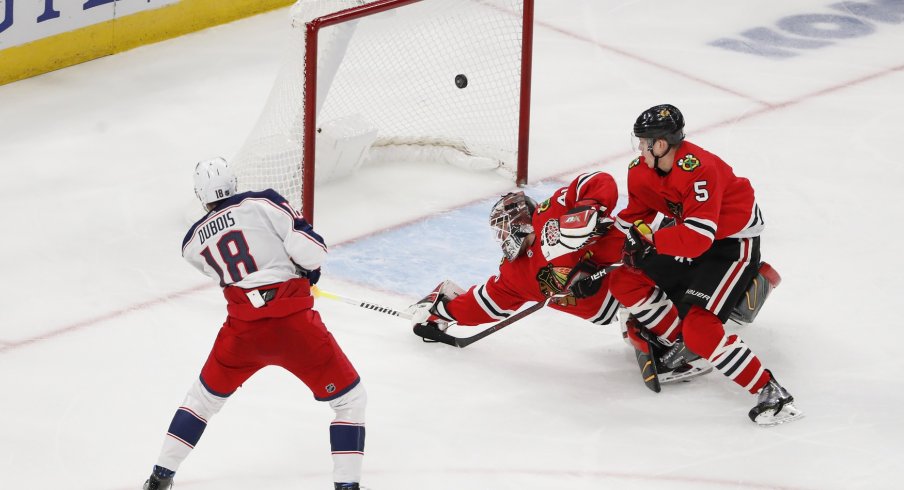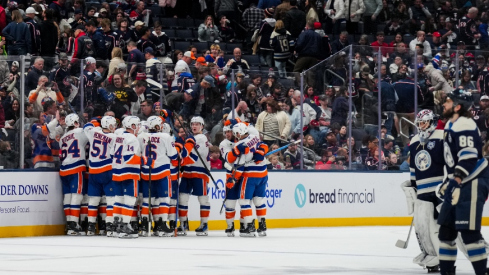Precisely two weeks before the Columbus Blue Jackets season opener, it happened.
Pierre-Luc Dubois agreed to a two-year, $10 million contract New Year's Eve, removing the proverbial elephant from the room.
And in its place, a much larger elephant.
And theres the bridge deal. Really made the most sense for both sides to go this route. Whether or not this leads to a trade over the next year, we shall see. https://t.co/CvKI8VGfob
— Pierre LeBrun (@PierreVLeBrun) December 31, 2020
We'll get to that, but let's take a step back first and better understand exactly what is happening: The 22-year-old top line center for the Blue Jackets gets $3.35 million this season, and that nearly doubles to $6.65 million for 2021-22.
So, is he free to go where he wants after next season? Not exactly.
The league's collective bargaining agreement (CBA) states that for a player to become an unrestricted free agent – that is, freely sign wherever he wants – he must be either 27 years old, or, have at least seven years tenure as an NHL player.
Any player whose contract has expired can declare himself an unrestricted free agent if he is at least 27 years old or has at least seven years playing as an NHL player.
Dubois has five years until he's 27, but in his fourth season. This two-year deal means we'll be in the same position before the 2022-23 season. At that point, Dubois will have five years as an NHLer and will be 24 years old. He won't be an unrestricted free agent until the conclusion of the 2023-24 season. Until that point, he is a restricted free agent.
Restricted free agency can get muddy in a hurry, but here's the gist: when a player such as Dubois is a restricted free agent, he can openly negotiate with any team. But he can only sign an offer sheet with one team. The offer sheet can be simplified as an "in-theory" contract. Once an offer sheet is signed, the team that owns his rights has seven days to make a decision. Their decision will be to either sign the player to a matching contract as the offer sheet that the player just signed with the other team, or, they can let that player go to that other team, where the offer sheet becomes a contract.
The reason offer sheets are rare are two-fold: for one, teams typically need a lot of cap space to make an offer sheet signing, because the players signed to offer sheets are typically young, high-ceiling players like Dubois. However, the second reason, is that if a team (like the Blue Jackets) were to lose a guy like Dubois to an offer sheet, wherever he signs would have to give Columbus draft picks in return. The quality of those draft picks can vary, but had someone signed Dubois to the same $6.65 million that Columbus has him for next season, that team would have had to give Columbus a first round pick, a second round pick, and a third round pick. If someone were to give him a big pay day, say, $9 million, then they would have to make it two first rounders, plus the second and the third.
And no team in their right mind would sign a player to an $11 million offer sheet. Aside from the fact that it's too much money for any non-generational talent, it also means four first-round draft picks going the other way.
So, while general manager Jarmo Kekalainen was worried about someone trying to swoop in and grab Dubois, many teams were feeling financial pressure as a part of the COVID-19 fallout, and now that we're seeing players like Mike Hoffman signing tryout contracts, it seems like no team was even remotely close to offering Dubois a rich enough contract for the Blue Jackets to not match.
And perhaps that, in part, is what led us to this:
Pierre-Luc Dubois is not in Columbus as camp approaches and remains unsigned. And now there are rumblings from a few teams around the league that Dubois may be looking for a change of scenery. Maybe wishful thinking on their part. But stay tuned on this one.
— Pierre LeBrun (@PierreVLeBrun) December 31, 2020
Now, let's be clear on one thing: This tweet from Pierre LeBrun of The Athletic was posted just hours before Dubois signed the contract. Additionally, it was also pointed out by Aaron Portzline, also of The Athletic, that Dubois had been in Columbus for the last number of weeks and skating.
Yes. He left town. He will be back in time for camp. https://t.co/Qfx2FbRAMX
— Aaron Portzline (@Aportzline) December 31, 2020
With that clear, the obvious brow-raiser there is LeBrun's tweet that hinted at the possibility of a Dubois trade. When the contract was signed within that same afternoon, some were quick to jump on LeBrun for what they called false reporting. Some were also thrown off by this tweet from Portzline following confirmation of the contract:
Two year, $10M for Dubois. The deal is done. #CBJ
— Aaron Portzline (@Aportzline) December 31, 2020
$3.5 million this year, $6.5 million next season
As for the trade request, lets see where this goes
At this point, let's discuss that "bigger elephant" and why what you've read so far is related to the situation with Dubois.
If in fact, Dubois has expressed an interest in not signing long-term with Columbus, it will mean there is absolutely no offer sheet coming when we do this again in just 18 months. No team is going to give up a bevy of high draft picks for a player they feel they can acquire at a lower value via trade, and talented players (especially top line centers, which are hard to come by these days) who openly want out have a significantly diminished trade value.
It's not uncommon for teams to lock up their young stars at this point. Connor McDavid signed an eight-year, $100 million contract with the Edmonton Oilers after his third season. For Auston Matthews, selected two picks ahead of Dubois in the 2016 NHL Draft, it was a five-year, $58 million agreement after his third season with the Toronto Maple Leafs. Jack Eichel, Buffalo: eight years, $80 million after his third season. The list goes on.
He's not quite on the same level as a McDavid or a Matthews, but he's certainly in the same category as Eichel, and if his bubble play was any indication, it's entirely within the realm of possibility that he matches or eclipses Eichel as an overall player by the end of this short-term deal. So it's fair to ask: why hasn't this happened with Dubois?
Perhaps Dubois feels misled. Kekalainen has a history of showing himself to be a tough negotiator, and it could be possible that Dubois's camp – and Dubois himself – weren't happy with the way that negotiations went this fall. If a player feels undervalued, it's reasonable to at least consider going somewhere where he would feel valued.
Could it be the relationship with John Tortorella? Lest we forget this exchange during in the qualifying series against Toronto:
Undervalued is one thing, but feeling disrespected is another. Was this exchange, which is not the only one the two have had, enough to plant a seed of doubt in Dubois' mind when it comes to where he wants to play long term?
Or, could he have dreams similar to Artemi Panarin? No, not dreams of the apparently hard-to-come-by-in-Columbus two-car garage. But dreams of playing in a city like New York, Los Angeles, or Chicago are often hard to shake, and maybe Dubois feels that his best chance at success will come in a market that is bigger than Columbus.
Or, was it all a tactic used to try and set Dubois up for more in the long haul?
The reality is, none of us know. Maybe Dubois himself doesn't know. Until he knows for sure, he didn't want to lose the flexibility that he now maintains. The two-year contract, which is team friendly from a strictly financial standpoint, will give him a couple of seasons to get clarity on any of the above.
It may be a while before this elephant leaves the room, but to use another cliche: where there's smoke, there's fire.
Let's see if that fire is put out by next summer.

